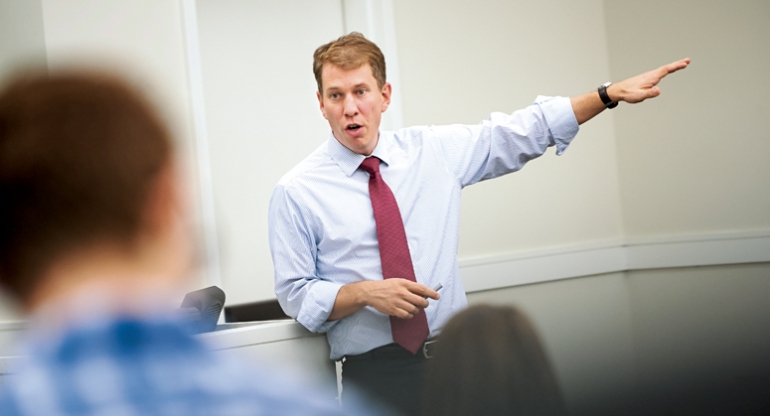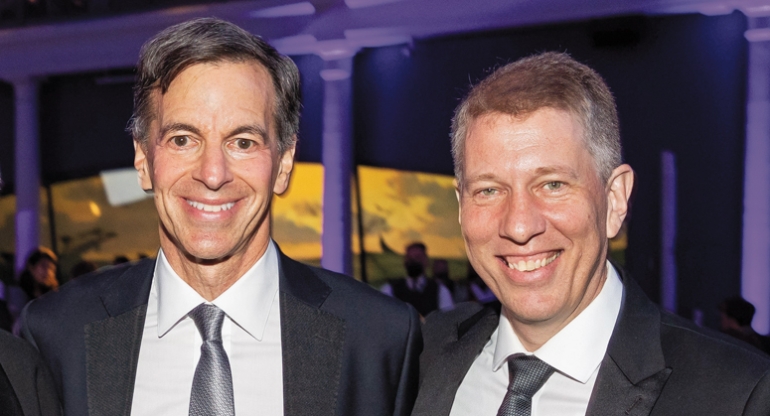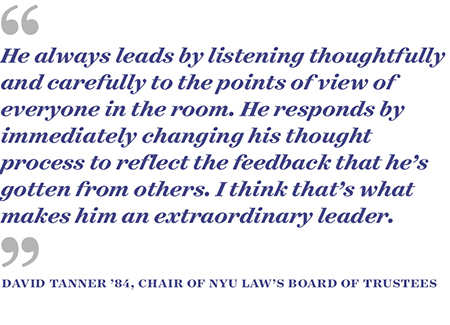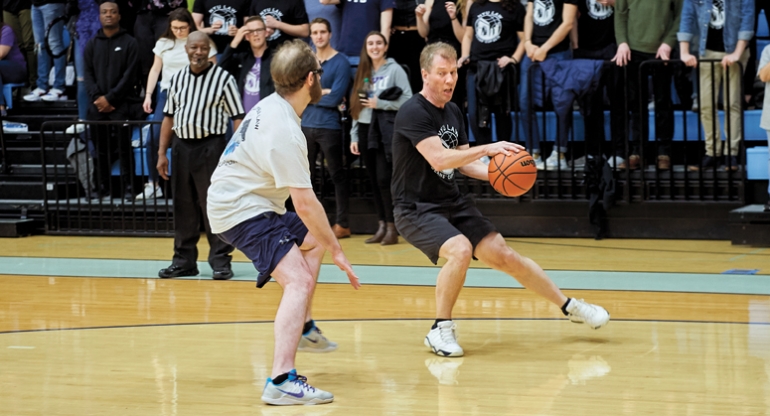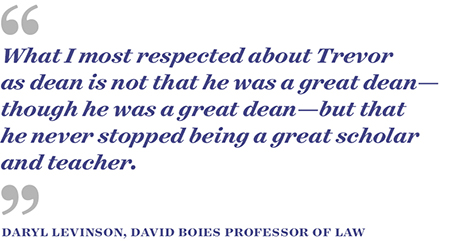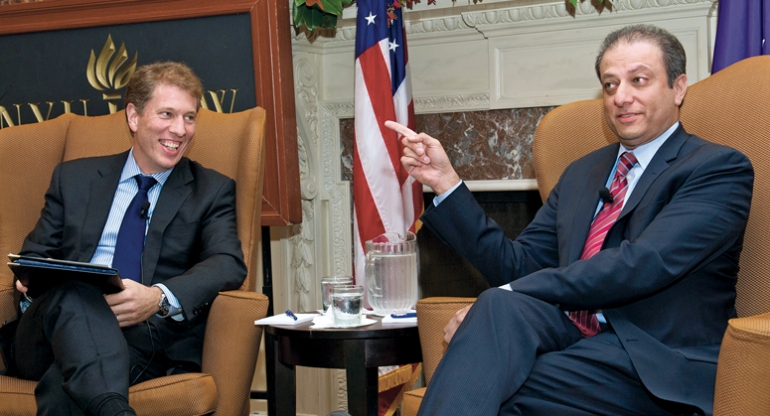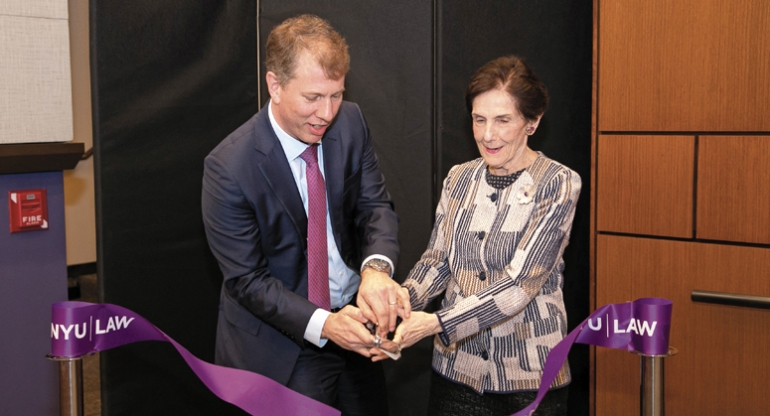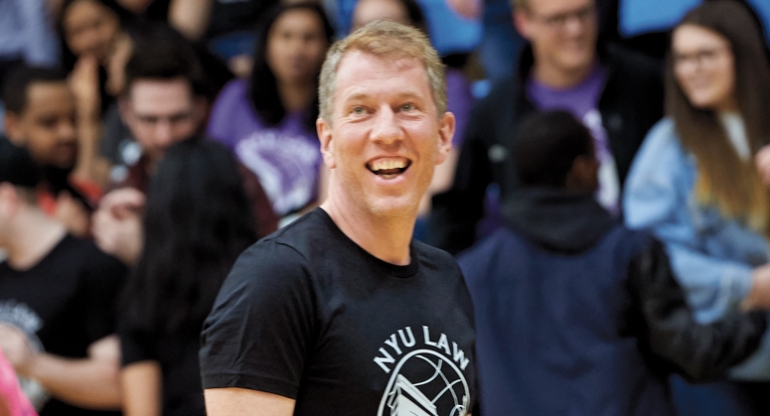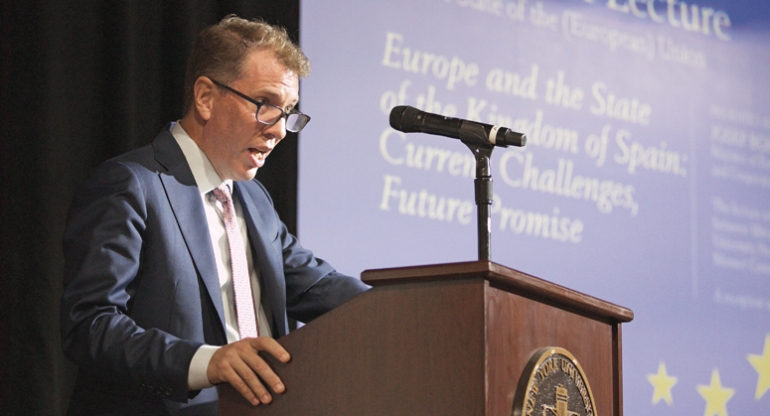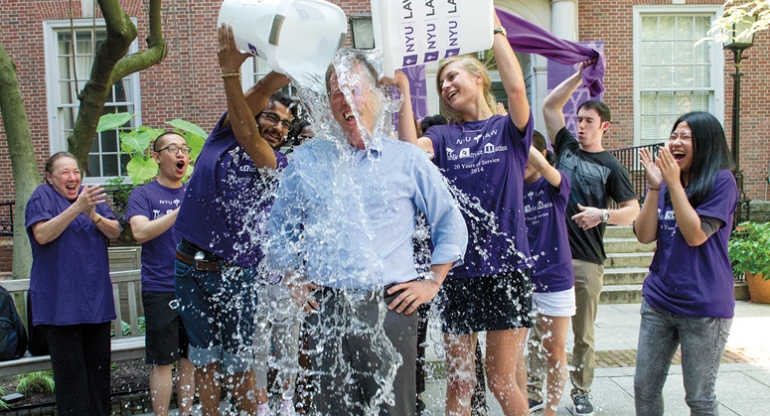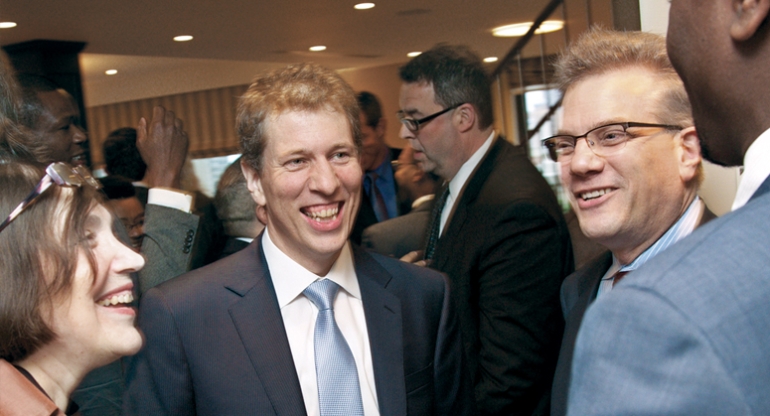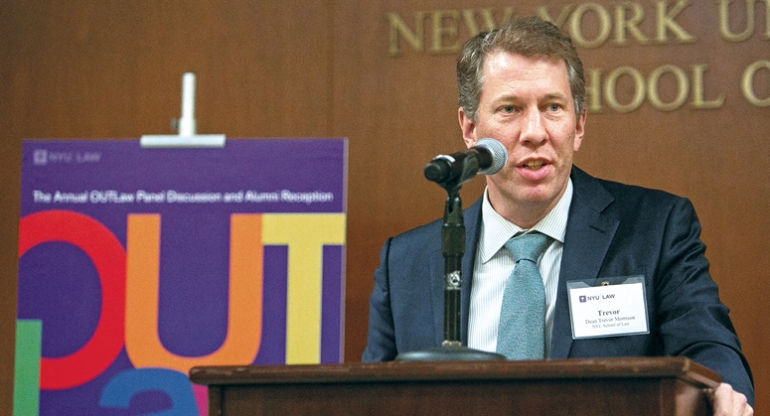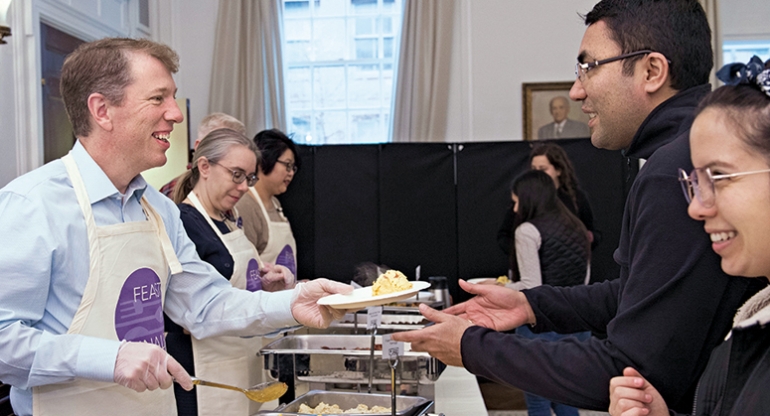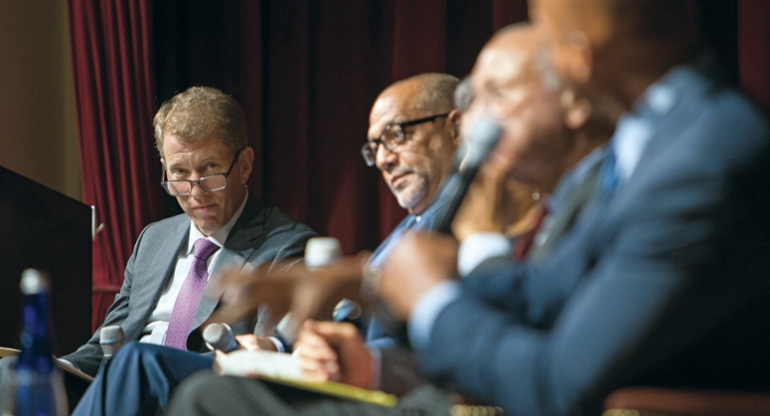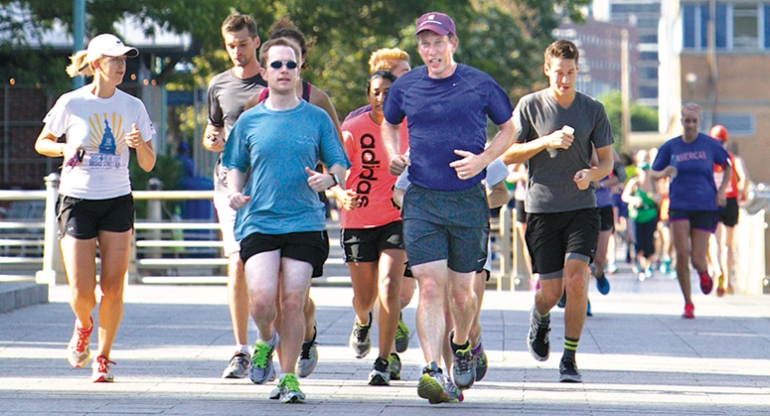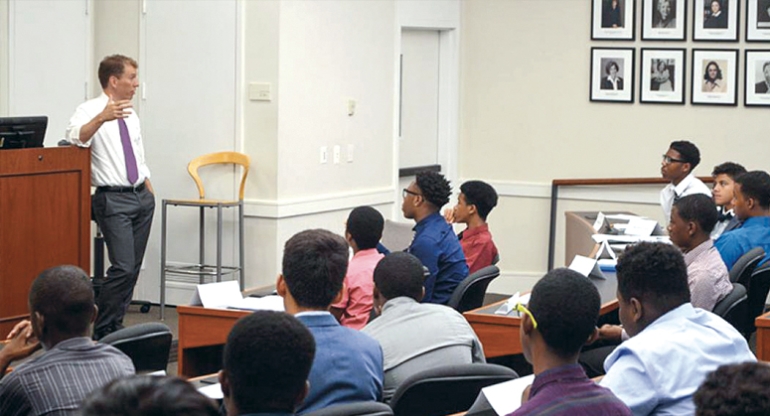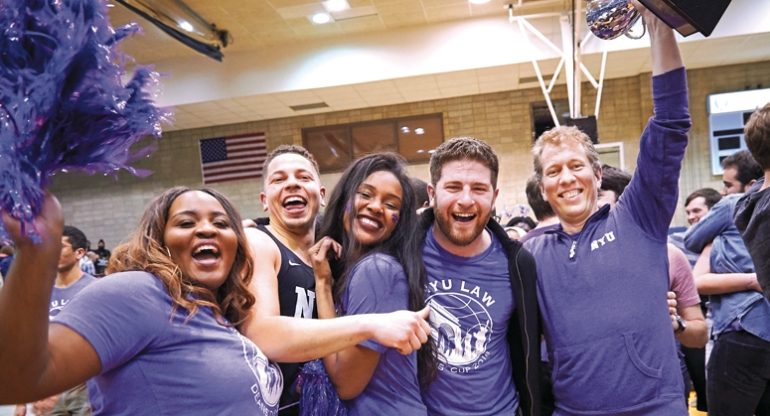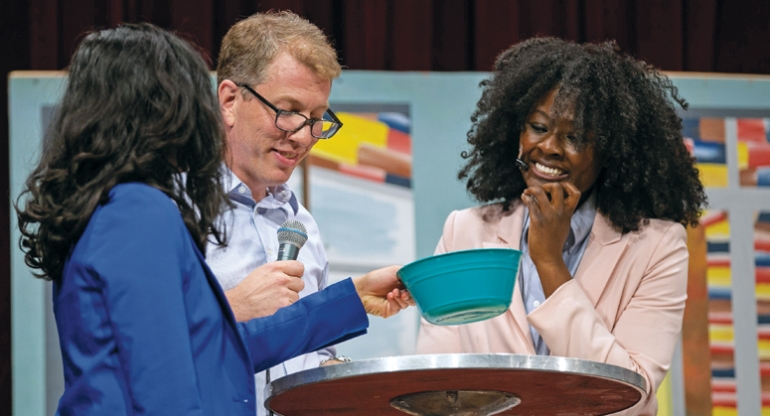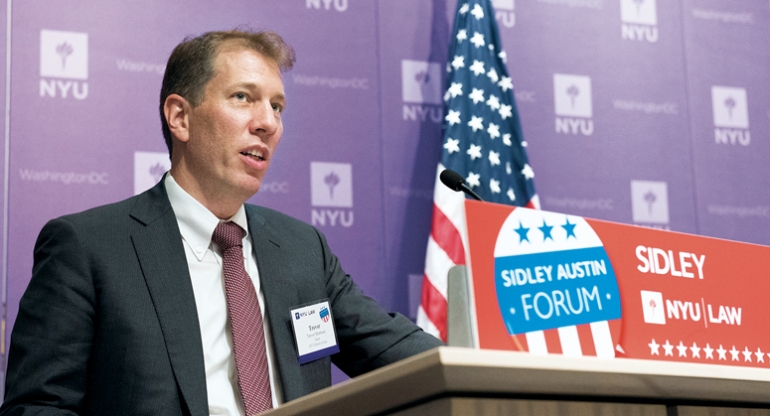Leading the Way
In his nine years as dean, Trevor Morrison broadened the excellence of an NYU education in an era of change.
BY ALANA GRAMBUSH
When Kenji Yoshino, Chief Justice Earl Warren Professor of Constitutional Law, approached Dean Trevor Morrison with an idea for a new kind of course, Yoshino knew it was a big ask.
The yearlong course Yoshino envisioned, based on feedback from students in his existing diversity and inclusion course, would focus on practical training for facing and overcoming common issues of bias and exclusion. But the new course would limit Yoshino’s availability to teach doctrinal courses such as Constitutional Law.
“I came to Trevor and said, ‘I’ve never seen any course like this, and I’m not sure how it will be received,’” Yoshino recalls. “But without any hesitation, Trevor said, ‘I completely support you. I see the value in doing this. It’s innovative, it’s what our students want and need.’”
Morrison says the decision wasn’t hard. “The faculty and the administration have a responsibility to ensure that we are providing our students with the best possible legal education, and we need to be prepared to make adjustments when needed,” he says. “This course built on the skills-based instruction that is already present in our curriculum while also bringing in new subject matter and new ways of teaching.”
A deep concern for issues of diversity, inclusion, and student success, as well as openness to new ideas and approaches, distinguished Morrison’s time as dean. On May 31, Morrison concluded a nine-year tenure during which the Law School hired a diverse cohort of faculty, founded numerous research centers, increased funding and scholarships for students, and finished a record capital campaign. Morrison, a former law clerk for Justice Ruth Bader Ginsburg and a former associate White House counsel, joined the Law School from Columbia Law School in 2013, becoming dean and Eric M. and Laurie B. Roth Professor of Law.
“I knew the second that Trevor finished his first interview that we had found our new dean,” recalls NYU Law Trustee Evan Chesler ’75, who was on the search committee that helped bring Morrison to the Law School. He says that the “overwhelming genuineness and honesty” that Morrison showed in that interview has been a defining characteristic of his deanship. “Looking at the past nine years, and all the success Trevor has had, I feel without doubt that we could have never imagined how right we were about selecting him to lead the Law School,” Chesler adds.
If success is calculated in numbers, NYU Law Board of Trustees Chair David Tanner ’84 says, one need look no further than the results of the Lead the Way capital campaign to chart Morrison’s effectiveness. Beginning in 2013 and concluding in August 2021, the campaign raised a record-breaking $540 million for the Law School, exceeding its initial and already ambitious $450 million goal.
But the most important goal, Morrison says, isn’t measured in dollars. “Since the beginning of my deanship, I’ve recognized that NYU Law produces graduates who have what I think is the best legal education in the world, who will go on to work on the most pressing issues in the country and the world. It’s important to think hard about who is provided access to this education, and how we can broaden that access,” he says. “For me, it’s not just thinking of changes we want to make in terms of numbers. It’s about thinking creatively about the community that we can create.”
Morrison says his vision for his deanship and the Law School was largely shaped during the creation of the Law School’s 2016 Strategic Plan. Beginning in Fall 2015, Morrison and other members of the Strategic Planning Committee, which included faculty, administrators, trustees, students, and recent alumni, spent a year on what Morrison called a “listening tour,” talking with students, faculty, alumni, and other members of the NYU Law community to identify priorities for the Law School. In 2016, the committee identified as top goals ensuring student success, cultivating diversity and inclusion, and expanding the Law School’s history of leadership and innovation in the legal space.
“Trevor is beloved by everyone who works with him, in part because of the way he listens, and I think this was really evident during the Law School’s strategic planning process,” says Tanner. “He always leads by listening thoughtfully and carefully to the points of view of everyone in the room. He responds by immediately changing his thought process to reflect the feedback that he’s gotten from others.
“I think that’s what makes him an extraordinary leader,” Tanner adds. “He has such a genuine concern, it makes you want to do anything in your power not to disappoint him—which is, I think, what also made him such a successful fundraiser.”
In his commitment to student success, Morrison prioritized minimizing financial barriers to students pursuing a legal education. During his tenure, the Law School added 82 new named JD and LLM scholarships. Since 2012, the year before the campaign began, the total number of JD and LLM students receiving financial aid increased from 593 in 2012 to 986 in 2021. The percentage of incoming JD students receiving scholarships also doubled, from 32.5 percent in 2012 to 66 percent in 2021.
Morrison strengthened the Law School’s connections within the University to foster interdisciplinary study, launching two joint master’s degree programs: the MS in Cybersecurity Risk and Strategy with NYU Tandon School of Engineering and the MS in Health Law and Strategy with NYU Wagner School of Public Service. The Law School also added 15 new research centers on a broad range of topics including race, inequality, and the law; corporate governance and finance; tax law and policy; and social entrepreneurship. Since 2012, the Law School has hired 28 new faculty members, including 21 in tenured or tenure-eligible positions.
“The centers were really a key feature of Morrison’s deanship,” says NYU Law Trustee Debo Adegbile ’94, “because they allowed him to attract faculty members who are really at the heart of the most pressing legal issues, and also give students an opportunity to get involved in specialized research and advocacy work while still in school. I remain impressed by the breadth of substantive areas in which the Law School now offers expertise, innovation, thought leadership, and legal learning opportunities with practical applications.”
As part of the Law School’s commitment to diversity and inclusion, Morrison created the position of assistant dean for diversity and inclusion, held by Lindsay Kendrick. Morrison also points to the important work of three centers created during his deanship: the Center on Race, Inequality, and the Law, which uses litigation, education, and advocacy to help end systemic forms of racism; the Center for Diversity, Inclusion, and Belonging, which works to build more inclusive organizations; and the Birnbaum Women’s Leadership Network (BWLN), which offers training, networking, and mentorship opportunities to help students develop leadership skills. In Fall 2021, students of color made up 41 percent of the entering 1L class and women accounted for 57 percent.
Morrison “has been a strong supporter of advancing marginalized voices from the day he stepped into the deanship,” says NYU Law Trustee Sara Moss ’74, who worked with him to help found the BWLN in 2017. “The legacy he leaves behind mirrors his core beliefs in the value of gender equity, of racial equity, and the importance of listening deeply to those most impacted by inequity,” she says.
Morrison continued to engage in public service during his deanship. In 2021, President Biden asked Morrison, a noted scholar on the constitutional separation of powers, to serve on the Presidential Commission on the Supreme Court of the United States, alongside faculty members Bob Bauer, professor of practice and distinguished scholar in residence, and Richard Pildes, Sudler Family Professor of Constitutional Law. The commission’s December 2021 report analyzed a range of potential reforms to the Court, including term limits and enlarging the Court.
The global COVID-19 pandemic posed novel challenges during Morrison’s deanship. Morrison led the Law School through a series of steps to keep the NYU Law community safe while maintaining the school’s educational mission: a move to online classes in March 2020, a return to campus in Fall 2020 under new health protocols, and continued adjustment of those protocols to the changing conditions of the pandemic. The Law School’s operations had to be reimagined in ways large and small: David Tanner remembers Morrison going in to the Law School over the summer to test the technology required to teach hybrid classes to better aid faculty and students. Morrison created a hardship fund for students particularly impacted by the pandemic, and to provide greater flexibility for LLM students who faced pandemic-related travel bans and visa backlogs, he and the faculty made a big change in the academic calendar for 2021.
“I remember distinctly coming to the faculty and saying, ‘We need to create a summer semester for Summer 2021. I can’t offer additional pay for teaching in the summer semester, but institutionally, we need to do this, and if people are willing to volunteer, I’d be grateful,’” Morrison recalls. “And the amazing thing is that far more people volunteered to do it than we could actually include in the semester. It wasn’t a lack of teaching supply. It was oversupply. I think that speaks volumes about our faculty and administrators.”
Safeena Leila Mecklai ’21, who served first as vice president and then as president of the Student Bar Association (SBA), worked with Morrison on issues brought on by remote learning, the challenges with the bar exam for graduating students, and persisting concerns about pass/fail grades, among others. “It was the arguments that we could make in light of students’ real, lived experiences, that really made the difference to him,” she says. “He really took his time to try to understand the student perspective, and you saw that in the way he was always willing to participate in town halls and answer student questions. He was always transparent with the constraints he was working under, and he always gave SBA credit when we pointed out some way that the University could be supporting students better,” she says.
Eleuthera Sa ’21, a Furman Public Policy Scholar who served as Morrison’s teaching assistant after taking his Constitutional Law course, also notes Morrison’s openness and willingness to listen to students. He often strayed from his lecture outline to engage in an interesting idea, she says. “It makes you feel so valued as a learner. It energized the entire class,” says Sa. When she became editor in chief of the NYU Law Review, Sa recalls, Morrison told her to feel free to send along any articles she wanted him to look at for peer review. “And he would!” she says. “I don’t know how he found the time.”
View photos of the unveiling ceremony for Morrison’s decanal portrait:
Morrison has also upheld the Law School’s tradition of lively intellectual debate, as a periodic participant in the NYU Law Forum, which in recent years has been sponsored by Latham & Watkins. Morrison has moderated and participated in discussions on subjects as diverse as how to leverage a law degree, new faculty publications, government lawyering during the Trump administration, the #MeToo movement, potential Supreme Court reforms, the role that lawyers play in democracy, and how the internet impacts issues of free speech, among others.
“What I most respected about Trevor as dean is not that he was a great dean—though he was a great dean—but that he never stopped being a great scholar and teacher,” says Daryl Levinson, David Boies Professor of Law, who has co-taught a constitutional law and theory colloquium with Morrison for years. “He is among the best constitutional law scholars of his generation…[and is also] an amazing and inspiring teacher. That was great for the students, but there is no way it was rational for Trevor. He did it only because he loved it,” Levinson says. He notes that Morrison also led a weekly faculty scholarship workshop, taught a federal courts course, and sat on the appointments committee, where he read hundreds of pages of scholarship each week. “Basically, Trevor moonlighted my entire job while carrying out his day job as dean,” says Levinson.
“In the classroom, Trevor not only taught his students legal doctrine, but also the poise and self-confidence that would help them to succeed as lawyers,” says Ryan Sila ’18, who also served as a TA for Morrison’s Constitutional Law course. Sila notes that Morrison was deeply embedded in student life, even outside of the classroom. Each year Morrison played in the faculty basketball game in the Deans’ Cup competition against Columbia Law, and attended the annual Law Revue performance, a satiric look at Law School life. One year, the production included a video that set Morrison’s career path to music in a parody of the song “Alexander Hamilton” from the musical Hamilton. “Trevor Effin’ Morrison” included lyrics such as “Expand our school’s diversity...increase financial aid / your work will never finish.”
“I remember being sent the video and looking at the title with fear,” says Morrison. He went to a remote corner of his apartment to give it an initial listen, before inviting his family to come watch with him. “I thought it was genius,” he says. His Constitutional Law students gave him a “Trevor Effin’ Morrison” nameplate that sat on his desk for the rest of his deanship.
“[Morrison] took on the leadership role here at NYU because he just wanted to make things better for other people in our community,” said Vice Dean and Charles Seligson Professor of Law Rachel Barkow at the 2022 dedication ceremony for the New York University Annual Survey of American Law, which this year honored Morrison. “In every way, he has done that,” she added, “for our faculty, for our students, for our administrators, and ultimately for the world, because he is helping to produce a generation of leaders who know from his example that you can be wildly successful, [and] also be a really good person.”
Of his future aims, Morrison plans to take a year of sabbatical to write about new issues in constitutional law and the separation of powers before returning to the Law School to teach. “Some pretty important things have happened in the realm of constitutional law and the presidency in the last decade,” Morrison quips.
“When I look at this Law School, there’s a history of great deans, John Sexton and Richard Revesz being the most recent examples,” Morrison says. “But I think it’s actually pretty hard to be a bad dean at this Law School,” he adds, noting that the community is itself made up of a broad, diverse range of impassioned students, faculty, administrators and staff, alumni, and trustees who are devoted to the Law School’s continued success. “Being dean of this Law School was the best job I ever had,” he says.
Alana Grambush is a writer at NYU Law.
Posted September 8, 2022. Photo credits: Legal Outreach (Teaching constitutional law to NYC high school students)


